Do Svidaniya, Russia

After 33 years of sweat and tears, Moscow’s Chief Rabbi Pinchas Goldschmidt chooses exile over support for Putin’s war
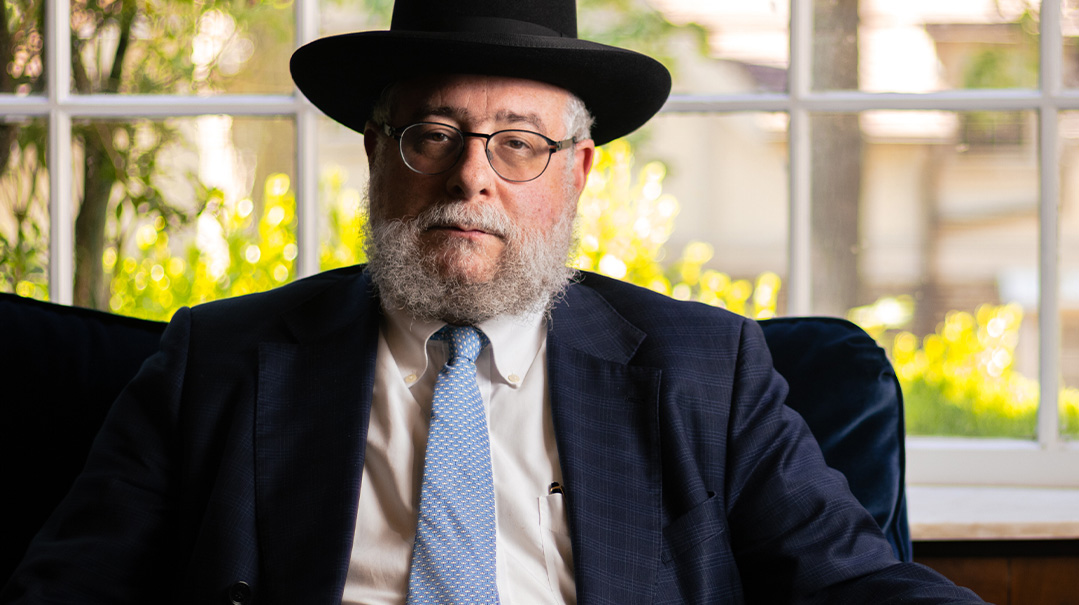
Photos: Yisroel Tesser, Ari Holzer, Eli Itkin, Menachem Kozlovsky
A Painful Parting
IT was the night of February 23, and longtime Moscow chief rabbi Rav Pinchas Goldschmidt went to sleep at home; the next morning he woke up in a foreign country.
This wasn’t another long-haul trip for one of the most influential Jewish leaders in Europe, who has practiced diplomacy from the Gulf to America.
It was because the country he had known for 33 years — from the twilight of the Soviet Union to the heights of the Putin era — had disappeared overnight.
That morning, as Vladimir Putin’s tanks rolled across the border into Ukraine and Spetsnaz special forces tried to seize Kviv’s airport, the Kremlin moved decisively to end the last vestiges of freedom across Russia.
Thousands of anti-war protesters were rounded up, independent media outlets were shut down, and religious leaders were press-ganged into supporting the Kremlin’s aggression.
“It was like going to sleep in Moscow and waking up in Tehran,” says Rabbi Goldschmidt. “The old Russia had gone.”
So, two weeks later, the Goldschmidts — who’d arrived as an idealistic young couple back when Jewish life in Russia was still heavily circumscribed — locked their home for the last time, unloaded two suitcases at the airport, and headed for Eastern Europe to be with the Jewish refugees flooding out of Ukraine.
The next few weeks were spent visiting different groups of refugees, scrambling to raise funds for the tens of thousands of Jews suddenly left shell-shocked and homeless, while trying to gain a foothold in their new lives.
Even four months later and with Russia now more isolated than it’s been for a century, Rabbi Goldschmidt can’t move on from the place that he called home for so long. He now shuttles between his new home in Jerusalem, Europe and America, trying to raise awareness for the plight of Russia’s Jews.
“Ukrainian Jews are receiving massive help — and rightly so,” he says. “But the far larger Russian Jewish community is in deep trouble. Sanctions on the oligarchs who supported the network of institutions have slashed funding, and there’s a sense of fear now.”
That’s why for the first time since he left, Rabbi Goldschmidt is telling his story — one that in some ways, is that of modern Russia itself.
As foreigners, the highs and lows of the Goldschmidts’ life in Moscow have been a bellwether of the government’s relationship with the outside world — warm under Yeltsin, fraught under the current government.
But even as the door closes on a life at the center of the post-Soviet Jewish renaissance, the Swiss-born rabbi is clear that the decision to come down on the side of the victims was the right one.
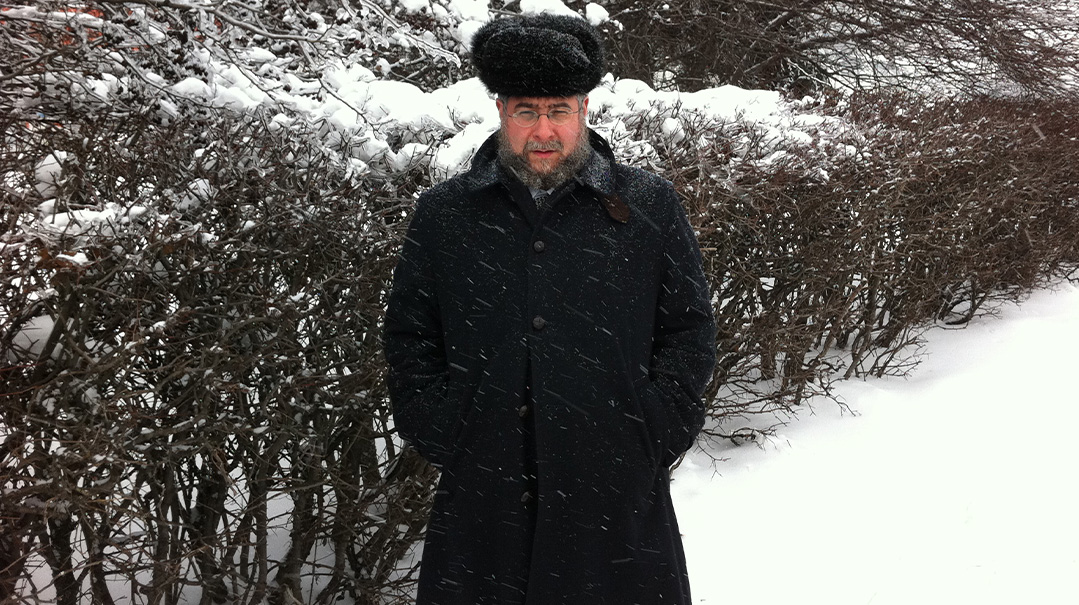
Within a few years of his arrival in Moscow, Rabbi Goldschmidt had developed the handful of Jews in the Arkhipova Street shul into an extensive network of shuls and educational institutions. With no choice, he’s left it all behind
The Way Forward
The Soviet Union that a young Rabbi Pinchas and Dara Goldschmidt encountered back in 1989 was on its last legs, eaten away from within by a disastrous economic system.
Nowhere was that more obvious than in Moscow. Capital of a superpower that ruled the lives of 286 million subjects, it was drab, threadbare, and to Western eyes, like a giant museum.
“It was like going back in a time machine, with cars from 40 years before. The stores were empty — there was hardly anything to buy besides flour.”
It wasn’t as if the Goldschmidts had just arrived from the lap of luxury, either. The couple had been living in the sleepy northern Israel town of Upper Nazareth, now known as Nof HaGalil and home to a large immigrant absorption center, when the rabbinical position had opened up.
“I’d completed a masters in engineering at Johns Hopkins, was learning in Ner Israel in Baltimore, when I got married and my wife and I decided to start married life in kollel in Eretz Yisrael. So, we moved to Yerushalayim in 1985 for two years where I got semichah in the Mir and then moved north to establish an outreach kollel in Upper Nazareth.”
The planned return to the world of engineering never happened; instead, exposure to the Russian-speaking world among the olim in northern Israel was the first step that led to Moscow.
The trigger was a phone-call in 1988 from an old friend from Zurich, who’d moved to Bnei Brak. The caller wanted to know whether his former classmate-turned-rabbi knew someone suitable to be the assistant chief rabbi for the Soviet Union, dealing with halachic issues under Chief Rabbi Adolf Shayevich.
“You have 10,000 candidates there in Bnei Brak,” was the newly-minted Rabbi Goldschmidt’s answer.
“Yes, but if you’re crazy enough to go and live in Natzrat Illit,” was the friend’s response, “you might be crazy enough to go to Moscow.”
That assessment proved wise. Intrigued by the challenge, the young couple decided to apply for the position and give it a try for a year.
Then Soviet politics intervened. The position had been dreamed up by World Jewish Congress head Israel Singer together with the then-Soviet minister of religious affairs. But when the high-ranking bureaucrat lost his position, the deal was off.
That wasn’t the only problem. Questions were being asked among some of the many cooks then stirring the Jewish communal broth in Gorbachev-era Russia about the wisdom of sending a 24-year-old to a major rabbinic post in a city of one million Jews.
It looked like the Goldschmidts would be staying put until an alternative route opened up. Despite the growing openness of the glasnost era in the late 80s, opening a religious institution such as a yeshivah in the Soviet Union was still banned.
So, in an effort backed by the head of the Soviet Academy of Social Sciences, Rabbi Adin Steinsaltz of Israel opened a Center for Jewish Civilization, which was a cover for Soviet Russia’s first yeshivah.
“The way forward was to bring me in as part of the yeshivah, but given the controversy around some of Rav Steinsaltz’s works, it was only with the support of Rav Moshe Soloveitchik of Zurich, who received approval from Rav Shach, that I made the move.”
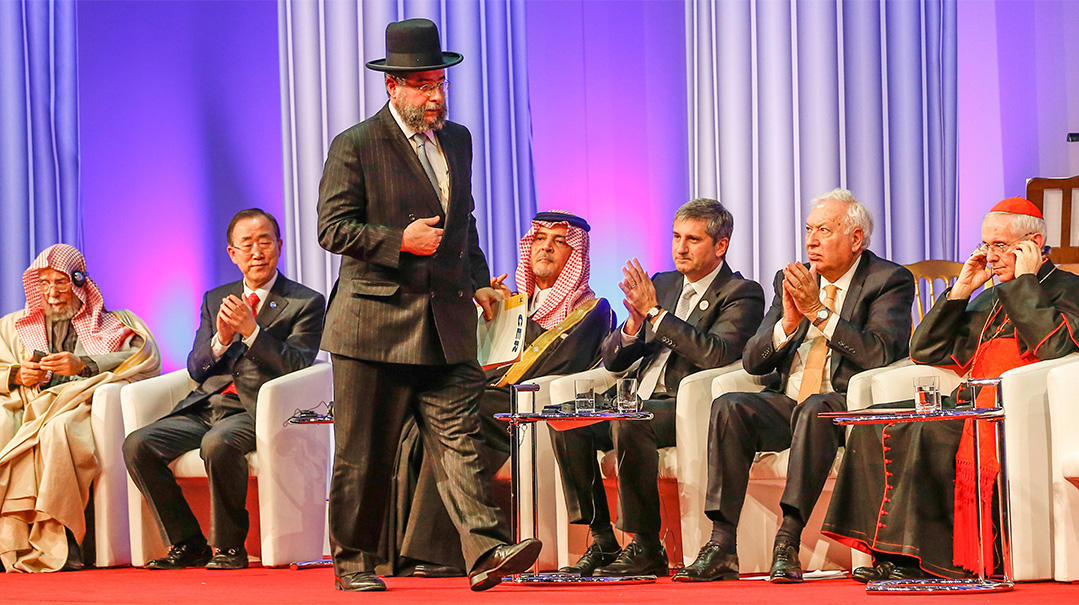
As head of the Conference of European Rabbis, Rabbi Goldschmidt created extensive ties with European and Middle Eastern leadership
Humble Beginnings
Moving from Israel to Russia in 1989 — into a yeshivah dormitory no less — was an unorthodox move, given that most Russian Jews were rushing headlong for the exit.
“Everybody had a suitcase packed and was looking for a way out,” recalls Rabbi Goldschmidt. “But at the same time, there were dozens of learning circles of the Agudah, Mizrachi, and the diamond dealers’ groups from Antwerp. One of my talmidim was Ze’ev Elkin, now a senior Israeli politician and originally from Kharkov, Ukraine. I started a beis din dealing with gittin and verifying Jewish status, which was very complex in Russia.”
“We sat down to write the first get in Moscow in decades, but the local paper was of such poor quality that the ink ran from letter to letter, rendering the get pasul.”
The solution was out-the-box: The rabbi removed the opening blank page from the front of a Gemara and rewrote the get.
By 1993, Rabbi Goldschmidt had been elected to the office of Moscow chief rabbi based out of the historic and imposing Arkhipova Street shul.
The position had an illustrious pedigree. “There was Rav Yaakov Mazeh, who though he was a government-appointed figure, was still a great Torah leader. He was well-known for his role as a witness for the defense in the trial of Mendel Beilis, and he’d learned with the Malbim. Rav Chaim Berlin served as rav of Moscow, as did a son-in-law of the Rogatchover Gaon.”
Almost as unusual as the reality that Rabbi Goldschmidt was living in the country at all, was the fact that he was dealing with thorny halachic issues at so young an age. Help, fortunately, was at hand.
“It wasn’t so simple to make calls overseas in those days,” he explains. “You had to place a request with the telephone exchange a day or two in advance, but I was in contact with Rav Moshe Soloveitchik, Rav Kreiswirth of Antwerp, and indirectly, with Rav Elyashiv.”
It helped that with the Iron Curtain crumbling, there was a constant flow of visitors including rabbanim and dayanim from Israel.
Unable to bring in educational material, the Goldschmidts came to Moscow armed with something else, a Xerox machine that they smuggled into the country in parts and which they had to keep hidden.
But with their copier they were able to get to work. The community rented a dacha outside Moscow, to which they brought a few local children each week. These young messengers would then pass on what they had learned to their families. “Whatever Jewish knowledge we transmitted was passed around the refusenik community like crumbs of bread among the hungry,” he recalls. “The biggest dearth we faced was that of basic Jewish knowledge.”
Yet material hardships were also in abundance. “Money was no problem,” he says, “because everything cost pennies, but there was little to be had. There were no washing machines or other appliances, and very little kosher food was available, just potatoes and kasha. David Hill from Brooklyn would donate cold cuts, so we could have meat for Shabbos.”
In a 2012 interview in these pages, Rebbetzin Dara — a daughter of Reb Tuvia Brodie of Monsey and a granddaughter of Monsey’s well-known cantor Jacob Rosenbaum — spoke about the blend of challenge and meaning that the couple found in those early years.
“I don’t ever remember feeling a sense of lacking something,” she said. “I always felt we had everything, plus more. I think our kids felt the same way. The only hard time, for the kids, was after an extended stay with family in New York.”
But there were difficult moments, especially in the beginning, when Rebbetzin Dara hadn’t yet learned Russian. Rather than focus on the negative, though, she chooses to look back at those early days with laughter.
“When we first arrived, I decided to take a walk with the kids in a nearby park, so we could get some fresh air. I figured that if I kept the green-colored fence in sight I’d be able to find my way back. Within a half hour, though, there was this howling snowstorm, and I couldn’t find my way. Whenever I would see a person, I would jump in the middle of the path and say ‘Gdye?’ — which in Russian means ‘where.’ Needless to say, the people looked at me as though I was deranged and hurried in the opposite direction. It’s a miracle that we found our way back an hour later, with me crying (I think).
“I do remember feeling isolated, but I was so busy with our children, who were little, and I spoke often with my family. I also began to make friends in Moscow. Mostly, though, I relished the sense of adventure, with our little family holding tightly together in a sea of storms. We took much chizuk from each other. Could I be idealizing things? It was a special experience for a family to be involved together in this project, a great blessing.”
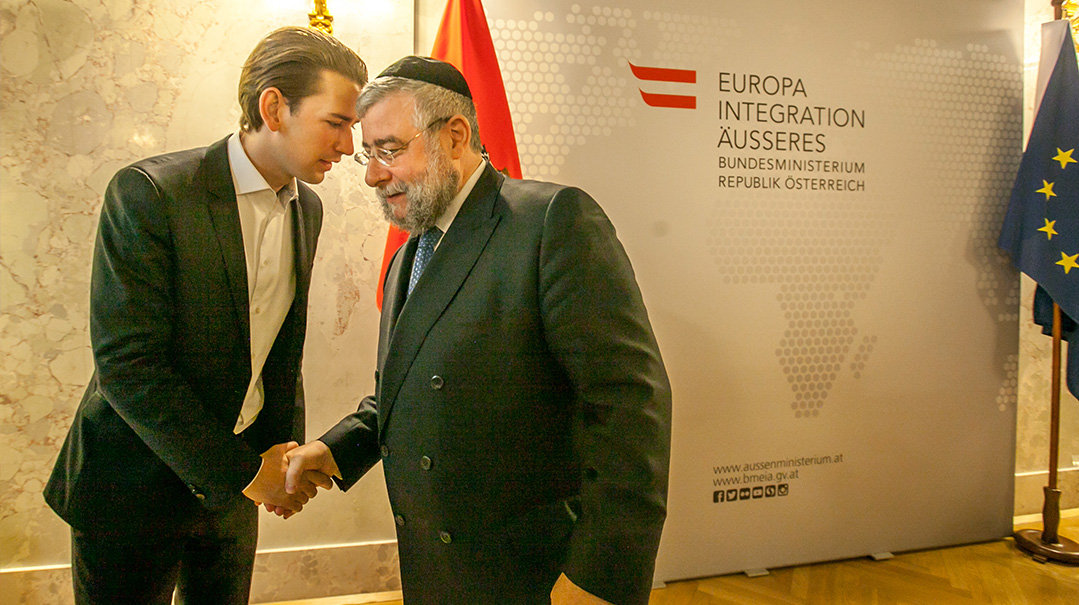
Russian Renaissance
Within a few years of his arriving in Moscow, Rabbi Goldschmidt had developed the handful of Jews in the Arkhipova Street shul into an extensive network of shuls, community organizations, and educational institutions, which he now leaves behind.
He rattles them off with pride, like the CEO of a sprawling conglomerate. “There are two schools: Eitz Chaim, a Lauder Foundation school with 550 children, and Reshit Hochma, for children with frum parents with 105 pupils. We have kindergartens, plus a yeshivah high school.
“There’s a yeshivah gedolah — Toras Chaim under Rav Moshe Lebel — and seminaries for women,” he continues. “We also have kollelim, including a Lakewood kollel headed by Rabbi Betzalel Mandel (whose wife heads Reshit Hochma), and Torah Mitzion, which my assistant Rav Yushuvayev has built into a beautiful community with hundreds of young families, many of whom are graduates of our schools.”
In the nature of successful organizations, the original institutions have developed satellites, including communities in Moscow and beyond, serving the Bukharian, Georgian, and Kafkazi kehillos, and a kashrus network.
Over the last years, this giant ecosystem — whose budget is now around $11 million — has matured to the point where Moscow and Russia in general are now on the European Jewish map in a way that would have been impossible to predict in those early years.
“A nachas moment came four years ago,” recalls Rabbi Goldschmidt, “when children from our schools joined an annual siyum Mishnayos that takes place in Zurich every year. The event draws children from Antwerp, Belgium, and London’s Stamford Hill and Golders Green communities. But for two years in a row, the first and second places in mastering Mishnayos went to boys from Toras Chaim in Moscow.”
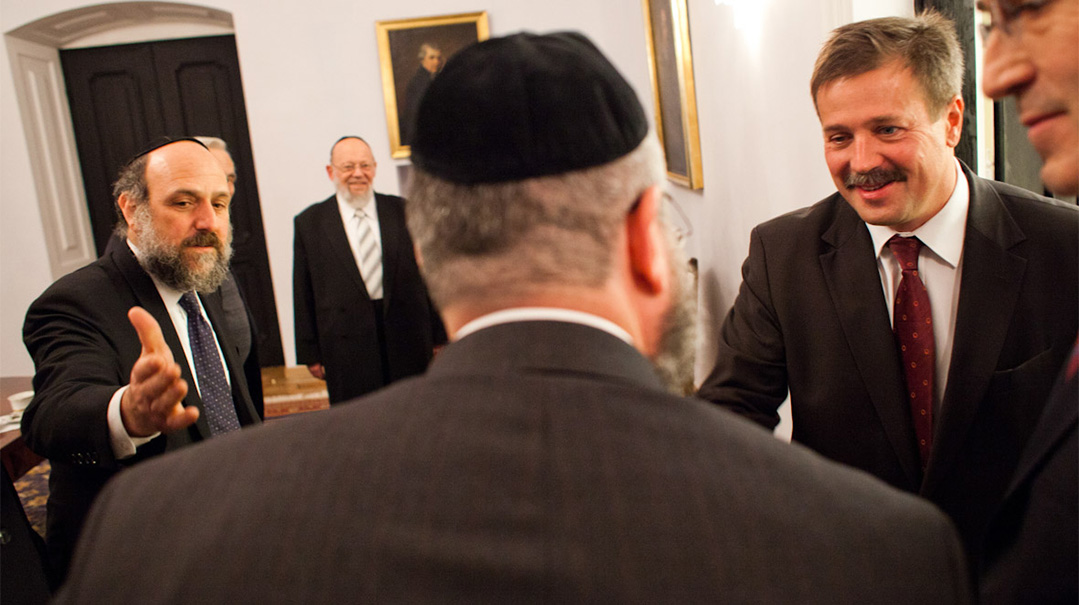
The Jews Were Back
Just minutes away from the Kremlin, Rabbi Goldschmidt’s base at Moscow’s landmark Choral Synagogue gave him a ringside seat to the leadership changes at the pinnacle of Russian officialdom in the years ahead.
By summer 1991, Mikhail Gorbachev was in trouble. Desperate to prevent the dissolution of the Soviet Union — by then well underway thanks to Gorbachev — the Communist old guard made its move. While the Russian leader was at his dacha in Crimea, KGB boss Vladimir Kryuchkov and members of Gorbachev’s cabinet ordered troops to surround the leader as well as arrest Boris Yeltsin, then Gorbachev’s number two.
“When an army refuses to shoot, that’s when revolutions succeed,” says Rabbi Goldschmidt. The coup unraveled when Yeltsin refused to back down, defying the danger of snipers to stand on a tank outside his Moscow office building, known as the “White House.”
An early signal that a new era of openness had arrived was a televised memorial for Ilya Krichevsky, a Jewish man who had been killed facing down the Soviet tanks. The memorial ceremony included the recitation of Kaddish.
“The moment that the words ‘Yisgadal v’Yiskadesh Shmei Rabbah’ were heard over the Russian airwaves was a seminal one,” Rabbi Goldschmidt recalls. “It was an announcement to anyone who would hear it that the Jews were back. They’d been oppressed, silenced, humiliated, but not snuffed out.”
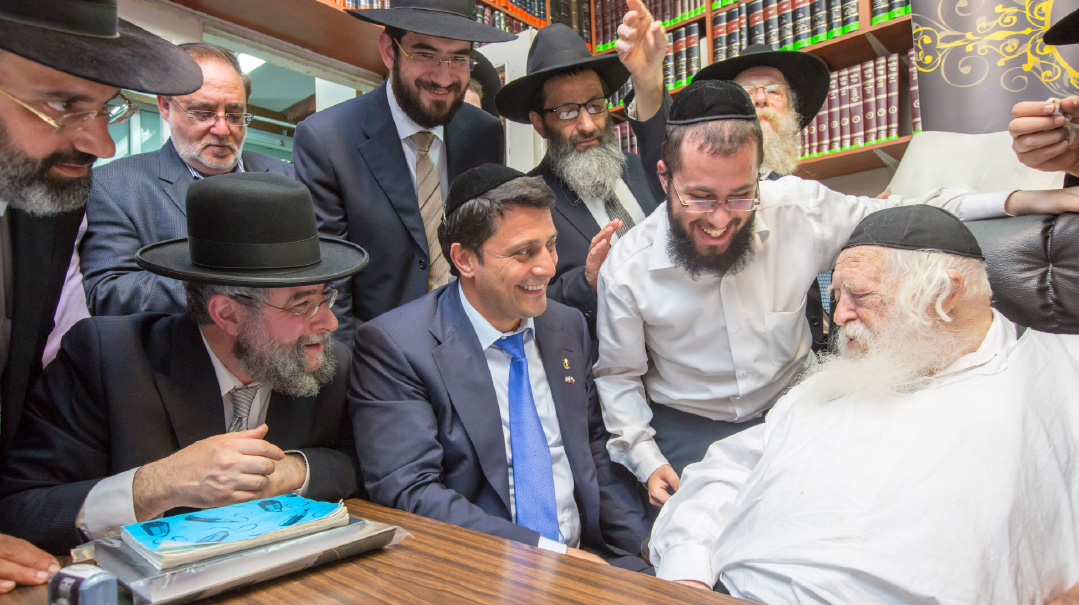
Rabbi Goldschmidt spent his teenage years in Bnei Brak, back when the gedolim of the generation were ever-accessible. He always remained at home there
A Puff of Smoke
With the advantage of hindsight, the downfall of the Soviet Union’s tottering, lumbering frame was inevitable. Outperformed economically by the West, the USSR couldn’t afford to keep up militarily as President Reagan initiated an arms race for which the Soviets had no answer.
But in real time, that vulnerability wasn’t obvious: No less than former CIA boss Stansfield Turner admitted in 1991 that the collapse of the Communist superpower had shocked the intelligence agency.
“I never heard a suggestion from the CIA, or the intelligence arms of the departments of Defense or State, that numerous Soviets recognized a growing, systemic economic problem,” he testified.
America’s spies weren’t the only ones left open-mouthed.
“Every Rosh Hashanah,” says Rabbi Goldschmidt, “whenever I say the words “vechol harish’a kulah ke’ashan tichleh” about the vanishing of evil like a puff of smoke, I think of the end of the Soviet Union.
“One day, we woke up, and this powerful regime that the whole world feared had simply vanished.”
The “August Coup” was the nail in the coffin for both the Soviet Union and Mikhail Gorbachev’s career.
Boris Yeltsin’s time in power was a mixed picture for Russia’s rapidly-organizing Jewish community.
“Under Yeltsin, we had a good relationship with the government which was liberal. I had strong ties with Moscow Mayor Yuri Luzhkov as well as with several government ministers. During that period, most Jewish day schools were established across Russia, but the government itself was busy with trying to revive the economy and wasn’t interested in what went on inside the Jewish community.”
One exception was that the Foreign Minister Yevgeny Primakov — himself Jewish — suddenly shut down the Jewish Agency.
“He was concerned about the brain drain — the loss of large numbers of Jews including many professionals — to Israel. I was involved in fighting the move, and in return for my efforts, Jewish Agency head Avraham Burg arranged the financing of a Moscow kollel, Torah Mitzion, through which hundreds of people became frum.”
The freedom of the Yeltsin era came at a price, though.
“There was a lot of crime and anarchy. Because the government was liberal but weak, and the power-brokers were strong.”
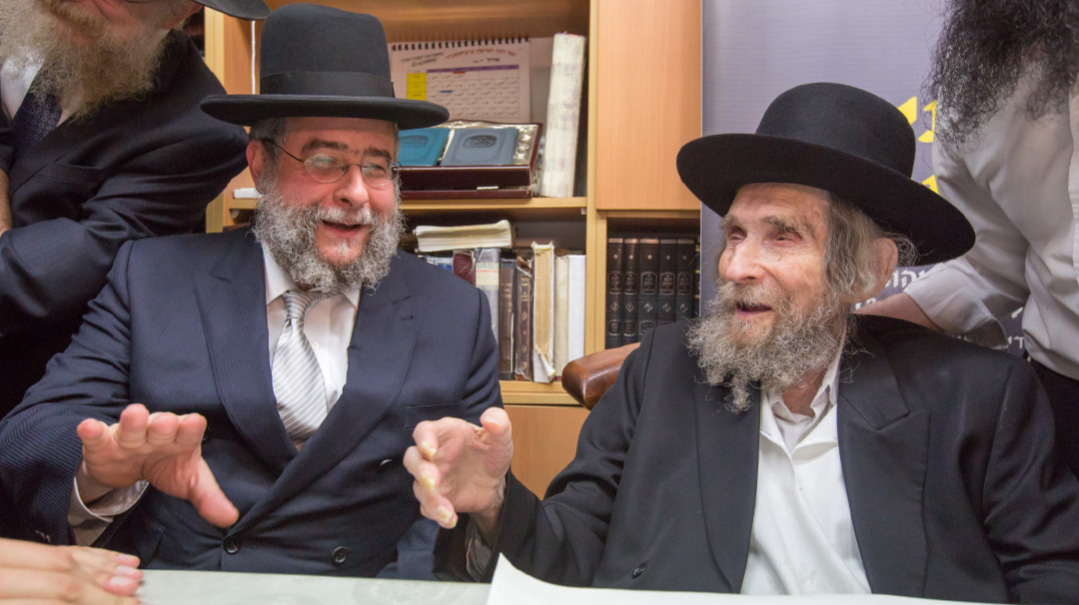
Money Men
High on the list of power brokers were the oligarchs — the men who’d used government connections and their own sharp wits to make enormous fortunes amid the chaos of Russia’s transition to a market economy.
The oligarchs became a symbol of all that was rotten in post-Soviet Russia. While ordinary people lost their savings, they bought superyachts berthed in Monaco and mansions in London. The massive amounts of dirty cash flowing into the British capital created what became known as “Londongrad” — ritzy areas of the city where Russian money pushed prices ever higher.
Many of the leading oligarchs were Jewish. Boris Berezovsky was a mathematician who made a $3 billion fortune selling cars. He was so powerful in the late 1990s that he had an office adjoining that of the prime minister.
Vladimir Gusinsky made billions as a media tycoon. Mikhail Khodorkovsky was Russia’s richest man, his Yukos oil company snapping up large parts of the country’s hydrocarbon economy.
All three flourished in the Yeltsin years and fell afoul of Vladimir Putin’s crackdown on the oligarchs.
Berezovsky fled to Britain in 2000, where he died — alone and almost bankrupt — in 2013. Khodorkovsky was jailed on trumped up financial-crimes charges, and his company was seized in 2005 in a move that shocked the Russian and international business community.
But it was Gusinsky’s troubles that threatened to put the Jewish community in the crosshairs.
Under the Yeltsin government, the Russian Jewish Congress — an umbrella body recognized by the authorities — was created, headed by the media tycoon.
On the Congress’s Presidium sat Rabbi Adolf Shayevich, under whom Rabbi Goldschmidt served. Rabbi Shayevich functioned in a semi-official capacity since 1983 as the chief rabbi of the Soviet Union, and then Russia’s chief rabbi.
Soon after entering office on the eve of the millennium, the Putin administration served notice that media freedom — meaning criticism of the government — was a thing of the past. In a meeting with the major oligarchs, he laid down the law to the incredulous barons who’d been used to a pliant government: Either toe the line, or suffer the consequences.
As owner of one of Russia’s most free-wheeling media outlets, the NTV television channel, Gusinsky was an immediate target.
In June 2000, he was arrested and spent a few days in prison. He quickly came to a deal to sell the troublesome outlet to Gazprom, the state-owned hydrocarbon giant.
Rabbi Goldschmidt was involved in the effort to free him. “In those years, Russia was far less isolated, and the government cared much more about foreign opinion than it does now. I called World Jewish Congress president Edgar M. Bronfman, and a few hours later, Bill Clinton came out with a statement protesting the move. A few days later, the authorities let Gusinsky leave the country.”
Rabbi Shayevich’s support for Gusinsky meant that both he and the Congress were out of favor with the new powers that be in the Kremlin. Not wanting to be accused of anti-Semitism, the Russian leadership quickly moved to create an alternative umbrella body, the Federation of Jewish Communities of the CIS.
Close links with the government meant access to funding. The Kremlin encouraged the oligarchs — many, as mentioned, Jewish and all by that stage pliant — to fund relevant Jewish institutions to the tune of tens of millions of dollars.
Given his close links with figures allied to the Yeltsin circle, Rabbi Goldschmidt found his relationship with authorities grow more difficult.
Three times — in June 2000, then 2005, and 2017 — the government attempted to expel him by revoking his visa. On one occasion the government succeeded; only support from the Russian Jewish community and international players allowed him to return to his community.
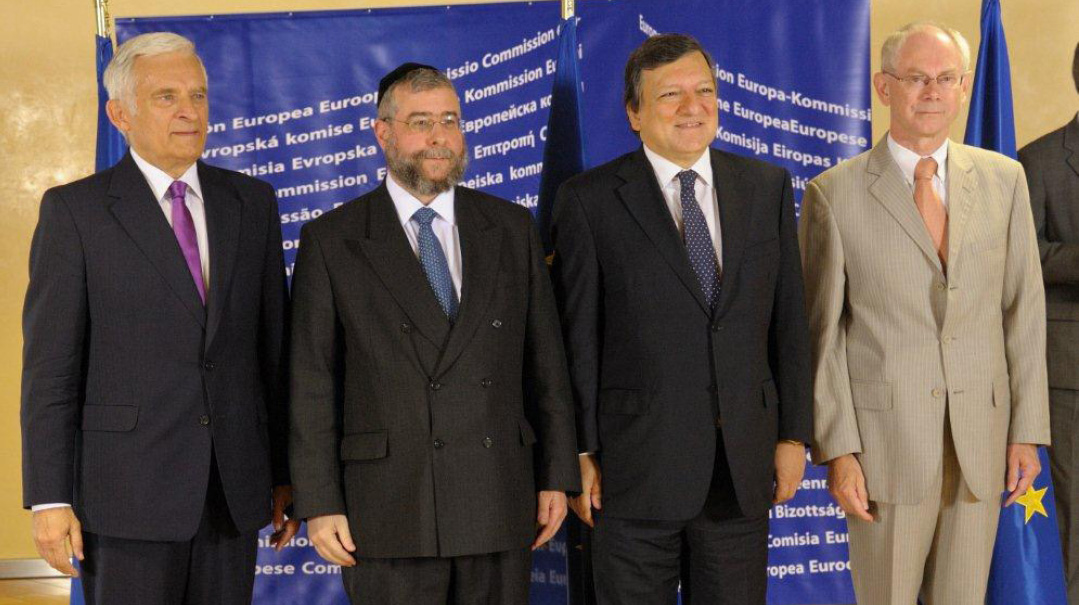
With the heads of the European Commission. Three times, the Russian government attempted to expel him by revoking his visa, but he was too well-connected with international players
Breaking Point
As Russia grew more inward-looking and less liberal under the Putin government, there was a growing personal tension for Rabbi Goldschmidt himself.
Chief Rabbi of Moscow wasn’t the only hat he wore: as president of the Conference of European Rabbis (CER), he interacted with European and American politicians increasingly critical of Russia’s direction. The dangers of becoming a “rav mita’am” — as government-affiliated rabbis were known in czarist times — was growing.
To previous generations of Russian rabbanim, the hard choices inherent in living under autocratic rule would have been very familiar. Chief Rabbi Berel Lazar, who heads the country’s extensive Chabad community and has enjoyed close links with Vladimir Putin himself, has tried to walk a fine line.
Shortly after the beginning of the war, Rabbi Lazar surprised observers by releasing a statement, which given the pro-war sentiment in the Russian leadership, was notably neutral.
He appealed to religious leaders everywhere to “join forces for peace” and to use their influence “to stop the chaos and prevent further casualties.”
Rabbi Goldschmidt chose another route, knowing that speaking out on the side of the victims would have consequences.
“Until February 24th, you could keep your head down and away from politics,” he says, in his signature slow, considered style. “After the war began, the government made it clear that whoever wouldn’t come out clearly in favor would have to go. The second highest figure in the Russian Orthodox Church, Metropolitan Hilarion, was moved aside.
“Without going into details, I received the message very clearly,” Rabbi Goldschmidt says.
Why, though, did Rabbi Goldschmidt not grit his teeth and obey the authorities, as rabbanim through the ages have done for the good of their community in galus?
“The tradition has always been to do what the poritz or Caesar says, but today, things are different for a few reasons,” he answers. “Eighty years after the Holocaust, we Jews are good at accusing Germans and Poles of not speaking out when they could have. We live in a global village and the whole world is listening to what we do or don’t say. So, we can’t keep quiet.”
The other factor that persuaded him that silence over the biggest act of unprovoked aggression in Europe since 1945 wasn’t an option, is the existence of Israel, which has changed the status of the Jewish people.
“Today, the world doesn’t see us as a persecuted minority, like we say in Tachanun — “la’ag va’keles ba’goyim.” The world is looking at Israel and the Jewish people and expects us to be on the moral high ground.”
No Interest in War
When the Russian Army force began a massive force-buildup on the Ukrainian border in late 2021, it was the Americans who sounded the alarm about Putin’s intentions.
History will doubtless show what intelligence the Biden administration was acting on, beyond the satellite images of tank laagers, but the increasingly certain warnings from the Unites States fell on deaf ears on both sides of the Russia-Ukraine border.
“The day before the invasion, I had breakfast with an Israeli official and some Russian parliamentarians,” says Rabbi Goldschmidt. “They dismissed the buildup, saying that Russia had no interest in Ukraine and that there would be no war.”
This wasn’t a ruse; asked whether he had known of the decision to go to war, Russian Foreign Minister Sergei Lavrov stayed silent. Observers think that it was Putin along with Defense Minister Sergei Shoigu who decided on the gamble, keeping the rest of the leadership in the dark.
“Russian and Ukraine fighting is like a civil war, not like a war between two regular countries,” Rabbi Goldschmidt says, trying to explain the widespread shock at the outbreak of fighting.
“My driver of many years was a Ukrainian who’d lived in Russia for 25 years. He told me of Russian media reports that the Russians had found signs of nuclear and chemical weapons in Kharkiv, Ukraine.
“Two days after war broke out, I arrived at shul on Shabbos morning, and saw the guard watching his phone. It turned out that his son was in the Ukrainian army. These two peoples speak the same language, there are so many ties between the two sides. That’s why the idea of war between the two is surreal.”
With the perspective of a foreigner, Rabbi Goldschmidt himself wasn’t surprised by the invasion. “Firstly, we could all see the military buildup — my instincts told me that it was real, and I believed what the Americans were saying.
“Second, in recent years, the World War II victory over Nazism has become a very important part of the Russian narrative, the highlight of Soviet history. It’s taught in schools more than any other place in the world. The government has created a narrative that the war is a repeat of the struggle against fascism, with the Ukrainian leadership in place of the Nazis.”
The increasing prominence that Putin has given the “Great Patriotic War,” as the struggle against Nazism is known in Russia, is of a piece with the overall tenor of Putinism.
“Russia is traveling in an ultra-nationalist direction, hating the United States and the West, and it sees itself as an alternative to the morally-decayed West.”
Isolated Again
The Russian attack on the Ukraine drew stinging sanctions from both Europe and America, the intensity of which the Kremlin didn’t anticipate.
The effect on Russia’s Jewish community has been devastating.
“In one week, I saw many leading members of the community pack up and leave, almost all to Israel. All air traffic came to the West stopped; independent news sites were blocked in Russia. It was a drastic change for the worse.”
Russian Jews across the board are grateful to Putin for clamping down on anti-Semitism and for his close relationship with Israel, says Rabbi Goldschmidt. But he thinks that 90 percent of the community doesn’t support the invasion.
“Beyond the rights and wrongs of it, the end result — economic stagnation and being cut off from the world — is very uncomfortable for Russian Jews. I have a feeling that the vast majority will not want to live in a new Soviet Union, isolated from the world.”
That’s certainly where Russia and its Jews are now headed.
“Both Ukrainian and Russian Jewish communities face a smaller, more impoverished future,” Rabbi Goldschmidt. “The shortfall in our own network of institutions is now $5 million as a direct result of the war and sanctions.”
The supply of oligarch money that has been the lifeblood of the post-Soviet rebirth has been cut off. The money that has paid rabbis’ salaries, kept the lights on in community centers across the country, and kept elderly Jews above the breadline has vanished under the severe sanctions regime that the West has imposed.
One upside of the wartime atmosphere, Rabbi Goldschmidt notes, has been a renewed interest in Judaism from unaffiliated Jews.
“These trying times are also very special times for those working in kiruv. I’m getting reports of people who forgot their Jewish identity walking into shuls and yeshivas and starting to learn. We can do today what couldn’t be done in other times.”
Silver lining apart, the storm clouds are real and menacing.
“There’s economic uncertainty, and for the first time, ordinary people are scared to talk about the situation, even over the phone. Whoever doesn’t have a second citizenship should get one as quickly as possible, because we don’t know how long the Iron Curtain will stay up for.
“There’s a very real threat that what has been built here in the last 33 years faces collapse,” concludes Rabbi Goldschmidt. “That’s why we have to maintain the community structures, because there will be a Russia and Jewish community after Putin.”
No More Options
When the Goldschmidts boarded the plane to Istanbul that would take them to Budapest, the roundabout route symbolized the new Iron Curtain that the war has brought down over Europe.
Europe’s first large-scale shooting war since 1945 is also the biggest geo-political earthquake since Gorbachev brought the USSR down, in Rabbi Goldschmidt’s early days in Moscow.
Thirty-three years after arriving to take part in the rebuilding of the Jewish world that the Communists had destroyed, Rabbi Goldschmidt and his wife left with only two suitcases plus a lifetime of memories.
The couple’s peregrinations are, in a sense, the story of Russia itself writ small. The effort needed to make the short journey symbolizes the fact that attempts to straddle the free world in the west and the increasingly-closed one in the east are, for now, dead.
Moscow’s chief rabbi is now in exile, and it’s not clear when — if ever — he’ll be able to return. But as he continues to guide the Russian Jewish community from a distance, Rabbi Goldschmidt is active across eastern and western Europe in expanding the activities of the Conference of European Rabbis.
For a rabbi to be suddenly bereft of his community, though, can’t be easy. Not one to easily betray the feelings that lie beneath the surface, Rabbi Goldschmidt says merely that he had no choice.
“When I saw the waves of Jewish refugees flooding out of Ukraine and into neighboring European countries, there was no option,” he says.
“It was clear to me that this was a defining moment in history. I had to be able to look my grandchildren in the eye and say that I’d done the right thing.”
A previous version of this story stated that Rabbi Alexander Barada of the Federation spoke out in favor of the war. Based on a review of his statement posted online, that is incorrect.
(Originally featured in Mishpacha, Issue 918)
Oops! We could not locate your form.







